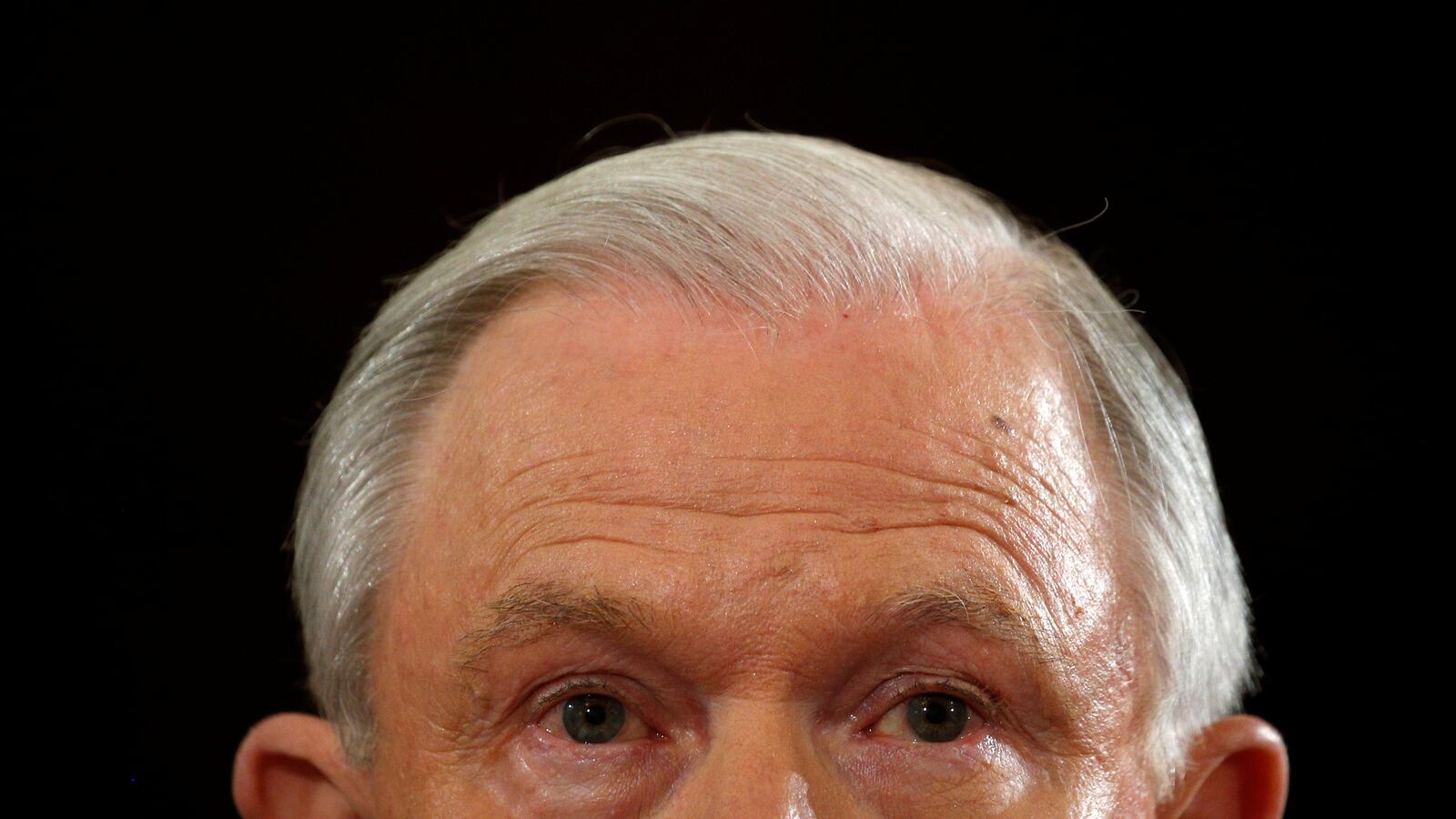Thirty-one years after the Senate Judiciary Committee shot down Jeff Sessions’s hopes of becoming a federal judge, he faced the panel again—and emerged largely undamaged. After more than 10 hours, round upon round of questions, and a host of noisy interruptions from protesters yelling about fascism and the KKK, one thing is sure: Sessions’s road to the attorney general’s office is as clear as ever.
The Alabama senator is Trump’s pick to run the Justice Department—an agency tasked with prosecuting alleged terrorists, protecting access to the voting booth, scrutinizing massive corporate mergers, advising the president on whether or not his actions are legal, and running the immigration courts that decide who gets deported. The attorney general’s responsibilities touch nearly every aspect of American life, which is why Sessions has arguably drawn more vociferous protest than any other cabinet nominee.
In 1986, members of the committee blocked his confirmation to a federal judgeship on the grounds that he harbored racial animus that informed his legal work. Republicans controlled the panel, but two voted against Sessions. This time around, though, committee Republicans have solidified behind Sessions—and even the Democrats on the panel have collegial relationships with him. So much so that several Democrats told Sessions they found it hard to grill him, and it showed.
And it’s unlikely their marathon excoriation changed anything. None of the committee’s Republicans expressed any skepticism about him. Meanwhile, Democrats’ attacks started limp and became sharper over the day—as reporters filtered out of the hearing room and reports about Trump and Russian intelligence took over the news cycle.
Behind the scenes, progressive activists conceded the hearing didn’t change anything. But they still found moments to love, particularly one line of questioning from Sen. Al Franken.
A Saturday Night Live alum, Franken is one of the few members of the committee who didn’t go to law school. But he pressed Sessions on the senator’s characterization of his work on civil rights cases. Franken got Sessions to concede that he had once exaggerated how many civil rights cases he prosecuted, and challenged him on how involved he was in voting rights and desegregation cases he cited in his initial disclosure paperwork to the committee. Sessions looked ruffled, and Ted Cruz tried to undo some of the damage in a later question-soliloquy hybrid.
Overall, though, Sessions was evenhanded and unflapped—even defending some of his would-be boss’s most dubious claims. In another back-and-forth with the Minnesota senator, Franken pressed Sessions on Trump’s infamous claim that he would have won the popular vote if millions of people hadn’t voted illegally. Did Sessions agree with Trump that millions of fraudulent votes got cast in November?
Sessions didn’t blink.
“Sen. Franken, I don’t know what the president-elect meant or was thinking when he made that comment or what facts he may have had to justify that statement,” Sessions said.
But he didn’t question it.
“Every election needs to be managed closely,” he said.
“I do believe we regularly have fraudulent activities occur during election cycles,” he added.
There’s no evidence that voter fraud had any significant impact on the 2016 elections, but Sessions’s suggestion that it may have points to part of the reason civil rights groups are so concerned about his move to the Justice Department.
Another exchange that will agitate progressives but do nothing to impact Sessions’s confirmation prospects came late in the afternoon, and sounded like a ’90s throwback. Sen. Sheldon Whitehouse, a Rhode Island Democrat, asked Sessions about comments he made years ago on secularism. Sessions emphasized that there wouldn’t be any religious test for prospective DOJ employees.
“And a secular person has just as good a claim to understanding the truth as a person who is religious, correct?” Whitehouse asked.
“Well, I’m not sure,” Sessions replied, smiling.
Then the two talked over each other for a bit, and Whitehouse moved on. But the progressive Interfaith Alliance released a statement criticizing Sessions for the comment.
“I am deeply troubled by Sen. Sessions’s remark that a secular lawyer may not understand truth as well as a religious one,” said the group’s president, Jack Moline. “It suggests that, if confirmed, he may well apply a religious test in hiring and firing lawyers at the Justice Department.”
But it won’t move votes.
That said, Sessions took care through the hearing to emphasize that he would enforce laws he disagrees with—first and foremost, Roe v. Wade. He criticized the pro-life group Operation Rescue, which praised him as an AG pick and released a “Wanted” poster of an abortion provider who was eventually murdered. And he even suggested pro-life activists’ hopes that the abortion rights could be fully rolled back under Trump could be unrealistic.
“Roe v. Wade is firmly ensconced as the law of the land,” he said at one point, “and I don’t know if we would see a change in that.”
The hearing made clear that he’s exactly the kind of person Trump would want heading Justice—extremely loyal, deeply conservative, and uninterested in generating headlines or undermining his boss.






